Video
Summary/Top Key Takeaways
Introduction & Background: Piyush introduces Nonna Milmeister, Chief Data and Analytics Officer at RMIT University in Australia, highlighting her expertise in data management, data quality and analytics. Nonna shares her journey from immigrating to Australia with minimal resources to becoming a data professional, emphasizing her passion for family and travel.
Professional Connection: Piyush and Nonna recall their initial meeting at a conference in 2015 and a webinar even prior, illustrating the networking aspect of the data industry.
Career Transition: Nonna discusses her transition from engineering to project management and ultimately to data management, influenced by experts like Data Quality guru Larry English.
Evolution of Industry: Nonna reflects on changes in the industry, noting her shift in focus from commercial technology & telecom industry to educational sectors and the importance of stakeholder engagement.
Utilization of AI: Nonna highlights AI applications at RMIT University, including text analysis for student surveys and predictive modeling for student course preferences and facilities capacity optimization.
Energy Management: RMIT's initiatives towards energy efficiency and carbon neutrality are discussed, showcasing data-driven approaches to environmental sustainability.
Advice for Data Leaders: Nonna offers guidance for new data leaders, emphasizing alignment with company objectives, understanding data fundamentals, and fostering a supportive culture.
Future of Data Management: Nonna predicts a continued focus on data fundamentals, ethics, and AI governance, while advising aspiring data professionals to invest in continuous learning and networking opportunities.
POV: Adopt three key habits: 1. Continuous learning. 2 Networking. 3 Fearlessly talking to strangers about career.
Never be afraid of learning. Never be afraid of networking and never be afraid of talking to strangers about you never know where the next opportunity might arise.
Full Transcript
Piyush: [00:00:00] Digital Agenda is all about data analytics cloud. AML and emerging technologies that are transforming not only companies, but also entire industries and even our lives. Hi, my name is Piyush Malik, a curious mind who wears and juggles multiple hats as an engineer, management consultant, practitioner, a builder, a thought leader, entrepreneur, and a C suite executive.
Our guest is Nonna Milmeister, who is an award winning and sought after data management champion. She's the chief data and analytics officer at RMIT University in Australia. She's a thought leader in data management, data quality, and related disciplines. Nonna, How are you doing today? [00:01:00]
Nonna: Good, thank you. Very nice day in Melbourne today. Sunny!
Piyush: I was there just about a month back and too bad we couldn't meet in person. So we are doing it via Zoom. But for the audience who doesn't know you - Please tell us who is the real Nonna and where were you born and what made you the data professional that you are today?
Nonna: Good question. Well, I was born in Moscow, in Russia.
I immigrated to Australia in 1991 with two very little kids and about 200 dollars in my pocket of total assets that we had at the time. . And with all of our immediate family still in Russia was quite a journey to establish ourselves. But you know, I always believe that if you put your mind into something, you can achieve whatever you think about achieving.
So I've completed a master's degree at RMIT University. And I started my professional [00:02:00] career. I have to say that the real Nona is all about family. Family is my priority. And the other thing is I love traveling. I've been to 52 countries. And yeah this is, this is what gives me an absolute pleasure to learn about different cultures, to learn about different countries.
And you know, it doesn't necessarily mean going to expensive places. I just as enjoy going camping and spending some time in the wilderness. But going to different places this is what the real Nona is probably all about.
Piyush: Beautiful, Nonna! I did not know that you have more stamps in your passport than me, so I'm a little bit jealous now. I thought with my trip to Australia and New Zealand recently, I added my 44th and 45th countries but you have already beaten me. But, who's counting, and we are all friends here. Tell us..tell the audience, how did we first meet? Do you remember,
Nonna: I think we met at the conference, [00:03:00] is that right?
Piyush: Yeah, the Baltimore (DGIQ) conference. We met in person in 2015 in Baltimore, but before that we had met virtually via a webinar at IAIDQ. Remember you were the APAC president of IAIDQ. And you were establishing the APAC chapter. And I was at the the parent body of IIDQ governing board. So that's when we had interacted long, long time back.
Nonna: Long time ago, but it was a good time. Yeah,
Piyush: It was. It was! And it's always great to connect with the data professionals who have this much longevity in the industry. And that's, what I appreciate about how tenacious our professionals are. And in one of our previous episodes at The Digital Agenda connected with Dr.Redman - Tom Redmond, who you also know, and Bill Inmon and so many other folks who we've had the pleasure of working in the industry by virtue of being in the industry for so long.
So, what I want you to reflect on now is, [00:04:00] Yes, you are an immigrant and as an immigrant in any new country, you've got to establish yourself. You've got to look out for the family, look out for the stability of income and fitting into the new culture. But at the workplace, You transitioned from one industry to another, and at one point when we have, we were talking, you were in the telco industry, and now you're in the education industry.
So talk us about that journey.
Nonna: Yeah, that was an interesting journey because I was an engineer by education. I, came to Australia with an engineering degree, but I came at the time of the recession. So there were no engineering jobs. And without local references or local experience, I had absolutely no chance of getting an engineering job.
And so I went and studied project management at RMIT University, where I work now and started working in the telecommunication company as a project manager. And [00:05:00] very quickly, I find out that I'm more interested in data and data quality than in project management. And so I've developed a methodology of how you can estimate the cost of product quality and the organization at the time gave me an opportunity to lead this area.
And so in doing so, I also met Larry English. At one of the conferences and then he came to Australia and this was the person who really influenced my thinking. I mean, he exemplified how poor data quality can destroy businesses. And you know, at the time that really resonated with me. And so that's basically how my career in data started. I did probably about 10 years as a consultant then 10 years in the industry. And now I'm working as a chief data and analytics officer at RMIT.
Piyush: Beautiful, beautiful! And talking of Larry English he passed away, bless his [00:06:00] soul - rest in peace. I had the privilege of working with him as well after attending one of his conferences way back in 2002/ 2003, and we also did. He used to do a column in a DM Review (monthly magazine) called “Plain English with Larry English” something like that.
And he asked me once to do a guest a column for him. And so that was when I saw how he worked. He was busy with his third book he was trying to write and said “This monthly column needs some, some TLC. So why don't you do it for me this time?”
So those were the good old days. And of course we've made many, many friends during our journey and through information quality, information governance, and you've had a role of managing P& L as well.
In, in your life, right after you from consultant life to the industry life that you had, you had management responsibility, people reporting into you. So, between the time then and now, what changes have you seen in the industry? And, and talk to us about [00:07:00] people aspect of it. Of course there's technology aspect, but what I'm interested in is finding the people aspect and how you’ve dealt with the stakeholder management aspect of it, especially as you are managing P& L.
Nonna: Yeah, it's interesting. I absolutely love working for RMIT and for university. The people are less interested in costs or, you know, making money. It's a not-for-profit organization. They are worried about success for their students, about quality of education and they're experts, you know, you're working with academics who are experts in their field and you can always find the interesting people to talk to who are very passionate about what they do.
So, I really enjoy working for RMIT and Yes in commercial organizations, especially in banking industry, insurance industry there are, it's, they're quite [00:08:00] regulated industry and maybe they started that journey a little bit earlier on improving their data, making sure they manage risk.
Education industry is a little bit behind, but they're also very willing to learn. And, and for me, when, when you think about the Stakeholders, as you said, and the people culture, the differentiator between whether a chief data officer is successful or not is really in that willingness of people, executives and non executives to take responsibility for data, you know, to really understand why data is important, to really listen to you when you talk about the impacts of poor data.
And universities are by nature -you know, very well positioned to listen and to understand because that's what they do for a living. They do research, they they implement innovation and they're very passionate about what they do. So once you convince them, there's no [00:09:00] stopping. So that's, that's why I really like education.
Piyush: Great. And it's a full circle moment for you. You studied at RMIT and now you're working there. Of course, after several years but, but to hop from one industry to another and then embrace it. And now you're not teaching there per se, but you are making the lives of students and administrators there better.
And in one of the case studies, I believe at RMIT, where you were using AI too. Yeah, data management to improve the outcomes to save the costs of whether you expand to a new campus, whether you have enough capacity. You want to talk about that?
Nonna: Ah, yes, we, developed a capacity model. It's really interesting because RMIT is one of the largest, if not largest landowner in Melbourne CBD.
We have more than 90 buildings that we own. Some of the buildings are very old. So. Some are new and they have different rooms with different [00:10:00] capacity for different purposes. How do you make sure that you have that right capacity for the students and for academics? And how do you know that you even have enough?
Like before, COVID we were thinking about maybe buying a new building because we were running out of capacity. And with that (predictive Analytics) model we have proven that we actually do have capacity. We just need to manage it better. And so this module is still in use and yeah, COVID changed quite a lot of that, but the students are coming back and you know, this problem will become a problem again one day.
Piyush: Yeah, till then you are making the best prediction through your model and Again, it's it's using your solid foundation in data and of course you, along with your team, are developing these models to predict. So Congratulations on the success of this model!
Now. A lot of folks in the industry are experimenting with AI and Gen ai. [00:11:00] So I'm assuming there's a lot more focus on GenAI, in your world as well. If not, talk to us about another case maybe you are seeing adjacent in your industry or other industries. specifically in Australia.
Nonna: Well, just before I talk about it I actually have to say that we talk a lot about generative AI and it feels like it's again seen as a panacea for everything.
And it might not necessarily be, you know, if a simple dashboard that you've never had before is enough to make a decision. Well, build a dashboard. Don't build something that is very complicated, because that's not what is necessary. And so you know, Our part of our strategy is moving from the simple dashboards through to AI, but, you know it's, it's really important to understand that AI sits on top of the iceberg.
[00:12:00] What's at the bottom of the iceberg, and what people don't really see, is a lot of mismatched data pieces that If you don't organize them now, if you don't pay attention to them now, if you don't understand how they're structured, how you link it together, you're probably not going to be successful in AI as well, because the real competitive advantage is always about how to use AI on your own data.
And if that data is of poor quality, well, you're probably not going to achieve your objectives. But in terms of what we do with AI and with generative AI, well we use LLM and machine learning to analyze data textual data for student surveys. In our industry, a lot of measures and a lot of improvement comes from students survey, because we do them on a regular basis at different points of student life cycle.
[00:12:00] And it used to take a huge amount of time to look through all of the qualitative comments that students made and, and, and look for improvements. Well, now that we have all of the outcomes of the survey in our data analytics platform, we can easily apply machine learning and AI. We actually apply natural language processing.
To analyze this surveys and to suggest areas of improvement. That made a huge difference to our university. The other thing is that I can probably talk about is it is very important to understand and RMIT is a large university. We have more than 90,000 students which students have a propensity for future for further study after they finish bachelor's degree.
And so we develop a propensity model that actually predicts which students will want to do that and which courses we should offer them. And that really improved that success rate of conversion as well. So there are multiple examples
[00:14:00] within RMIT, within the industry in general of how we can use you know, AI and ML. And yeah, we're definitely experimenting now with a lot more use cases that will You know, let us move into the future.
Piyush: That's great to know. And just to drill down a little bit on the density model, you don't necessarily need an LLM or a Gen AI model for that. No, you don't. Traditional analytics, advanced analytics, and maybe you know, some experimentation with AI I would say.
Traditional AI can build that model for you, which you can use. So, you know, not all problems can be solved or need to be solved by generative AI. Exactly. Exactly. Yeah. People,
Nonna: people sort of talk about gen AI and they, you know, Forget that you know, ML is part of AI and you know, there's so many other different AI tools that we can use and we need to use them appropriately.
[00:15:00]
Piyush:Yes,Yeah. So,I guess as we evolve in our understanding as the industry evolves, more smarter ways of using AI and deploying technology will be there.
And I was reading somewhere that even though we talk about it and we are gung ho about AI and genAI, the environmental impact of using these technologies is really harmful just like when crypto and bitcoin were hot four/ five years back and there were studies being done to say more mining means more heat being generated within the data centers and i'm sure the consumption of computing is increasing, consumption of storage is increasing and all of that because there are so many startups and as well as the incumbents, the, you know, hyperscaler companies, they're not sitting back idle. So innovation is rapidly happening and all of them are experimenting. So it's a lot of things happening and this results in a lot more energy usage.
[00:16:00] And I know there is a movement in a lot of universities to get to net carbon neutrality and net zero. I'm not sure if there's something specific that you want to highlight about RMIT?
Nonna: Yeah, absolutely. We have that target as well. And to help with reaching that target. We actually looking at how we measure our electricity, how do we measure, carbon use between all of our buildings. So we developed an analytics model that will help to understand where we use that energy where, which campuses, which buildings are doing better, which ones are doing not so good what time of the day is more important, how we can optimize the use of energy.
For this , you know, for all of our buildings to reach our targets. And this is, this is just the beginning because we can then start drilling down into more detailed and predictive analysis as well. So we started on that journey and it's been very well received, but again, there is a, there is a potential to build on that in the future as well.
Piyush: Beautiful. And using, you are using all your skills as a chief data and analytics officer there. So. Congratulations on driving that as well. Now, for the folks who are, intrigued by the entry of so many C-suite positions with the CDOs, Chief Data Officer, Chief Digital Officer Chief Analytics Officer, Chief AI Officer, so many C- titles which may be confusing folks.
So, as somebody who's taking the data leadership, whether it is a CDO or a chief AI officer, what are the top three things you would advise them to do in their 90 day plan?
Nonna: When they just start?
Piyush : When they're just starting, yes.
[00:18:00] Nonna: Well, I think, I think What they need to do is to understand what your company objectives are, what is their strategy, where they want to go. Because, you know, if you don't know where you're going, you can't get there. Only if you understand and align yourself with these objectives as a data leader, you can understand how you can help to achieve them. So I would spend a lot of time talking to people, talking to people, understand where their concerns are, where pain points are, but also where do they want to take the company that you're working with.
The second one is probably to understand What's happening within the data within your organization to start with? Do you have like the guts of the good data management practice? Do you have good data governance? Who is accountable for data in your organization? Do you have any governance forums where you can actually make decisions and influence where, where the organization is going?
[00:19:00] Do you have a conceptual and logical data model? Do you know how the data is organized? Do you have any metadata tools that can help you to bring business data with the technical data? Do you even understand what your business terms mean? Because sometimes you don't and sometimes you know, like in admission at university can mean different things to different people.
Piyush: So, Yeah, understand the data and technology environment, but also I think what's really important is the culture of the organization.
Nonna: So find the data. people who will really support you align with them and think about how you're gonna bring people on a journey. Like at RMIT, we probably have about 80 data stewards and we started with almost, you know, maybe, [00:20:00] maybe just a few. And, and that's a coalition that is not necessarily in your direct control, but this is a coalition of willing. These are the people that you can rely on and that will help you to implement what you need to implement. So that's probably what I would say and recommend for someone who will just stop.
Piyush: Awesome. So I think it's the foundation level. Asking the right questions and be curious and drill down deeper into understanding the organization, understanding the culture, what you have, and then take to the next level vision, aligning with the business objectives. Awesome! Great!
So in conclusion, we've had a great conversation so far. Put on your futuristic crystal ball and where do you see the world of data management go in the next three to five years? And what advice would you have for somebody who's just beginning their career straight out of college? Some of your students were at MIT or other universities. [00:21:00] So how would you guide them to in the field of data management to get started?
Nonna: Okay, so there are two questions in one by the look of it. Look, I think the fundamentals of data will still be important if not more important now with generative AI. So, I think metadata management data quality These are the, these are the things that will just develop and develop in the next few years.
AI can help with that, but AI will never sort of replace what the people can do. The other thing is privacy, security, and probably data and AI ethics is some of the a really important components of the future and they're rapidly developing. We are at the moment working on AI governance framework, and this is to me a fascinating area [00:22:00] because yes, you can experiment and you can build amazing tools, but things like fairness, transparency diversity, bias, accountability, You know the fact that we only build something if it will benefit our customers, benefit our society.
These things will still be important in, in the years ahead. And probably the other thing is if you are in data make sure that you understand how AI can help with some of this fundamentals, because it will now, nowadays you know, AI can, you know, Create models, create logical data models and cleanse data and suggest the best way to do things that will be just applicable to data as it is to other areas.
And so look, we actually do a lot of work with our students. And I really encourage students to, [00:23:00] get into data because data is where the future is. And if they do, you know, that's the first thing I can say is congratulations… you are in the right area. This is, this is where the future is.
How do you advance? Well invest in yourself first, you know, do some micro credentials courses, you know, online courses, there are a wide range of free courses online that you can do to advance your knowledge but also look for opportunities. Just because you haven't done it before doesn't mean that you cannot move into the data.
You know, if you graduated as a software engineer. You can still focus on data engineering components and data engineers are really you know, valuable skills nowadays, and they will be even in the future as well. And so invest in yourself, understand why you're doing this, talk to as many people as you can, especially professionals in your field.
And you know, you will find a [00:24:00] niche place and you'll find your passion. And if you're passionate about something, you will definitely succeed.
Piyush: Beautiful! Never be afraid of learning. Never be afraid of networking and never be afraid of talking to strangers about you never know where the next opportunity might arise.And at least you might make a new friend.
So With that Nona, it's been a pleasure hosting you here on The Digital Agenda. Really enjoyed our conversation. I wish you good luck and I hope to see you again sometime soon.
So before you go, this is -Namaste- which is in my culture, from my soul to you. Thank you for taking the time and let's stay connected.
Let's collaborate. Thank you!
Nonna: Thank you very much, Piyush, and Namaste.

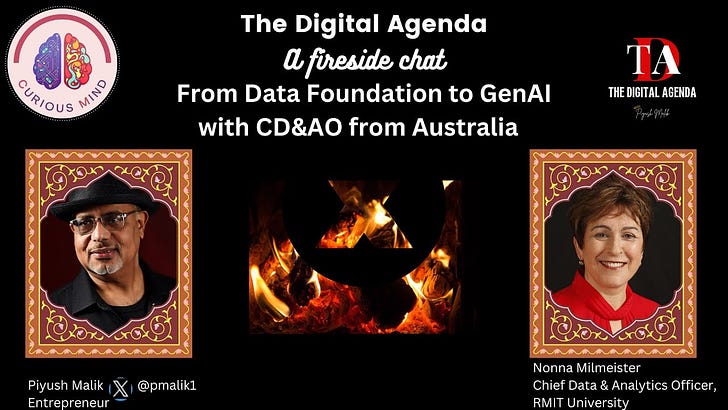




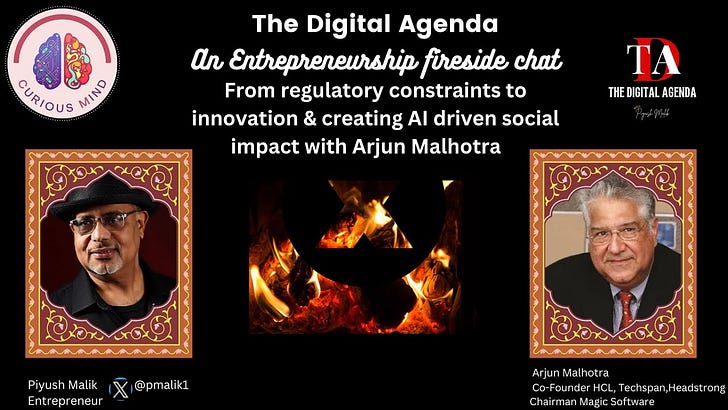
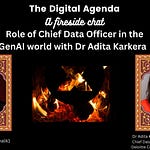
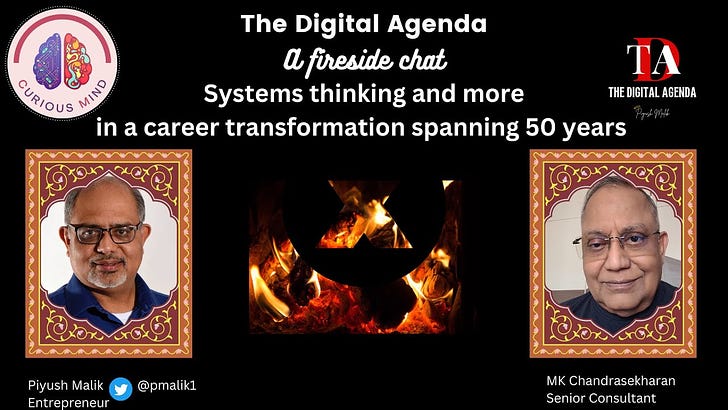
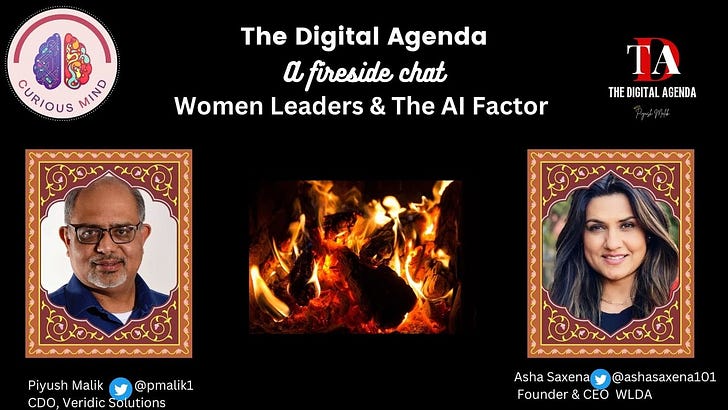
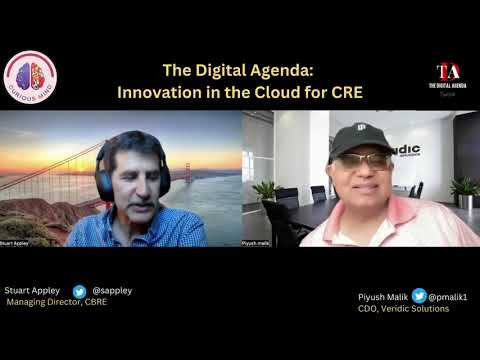
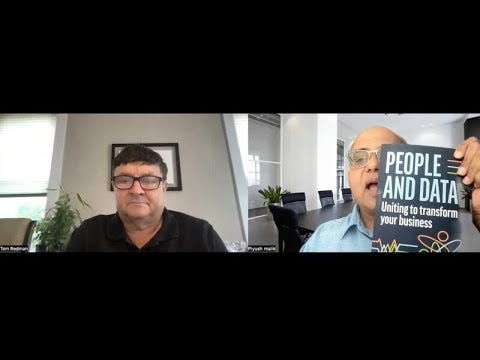
Share this post